Many of us like to think that we’re prepared to handle emergencies, but when tragedy strikes, it’s easy to forget everything you’ve ever been told. So if you need a reminder of what to do in stressful, life-threatening situations, we’ve got you covered, pandas.
First responders on Reddit have been sharing safety advice to help others avoid the most common, fatal mistakes they see people (and fellow emergency workers) make. From removing trip hazards from your home to simply staying out of the way in a dangerous situation, be sure to take note of any advice that’s news to you. And keep reading to find conversations with the Reddit user who started this thread and retired Fire Lieutenant and host of Responder Resilience, David Dachinger!
#1
Not wearing a helmet. On a bike? Wear your helmet. On a scooter? Wear a helmet! Motorcycle? You guessed it, helmet. Got a passenger? Insist they wear one too.
During my time as an EMT, I responded to too many incidents with victims who might have been able to walk away from the scene with only minor injuries *if* they had worn adequate head protection (and worn it correctly).
And as long as I've got you here reading this, please also *wear a seatbelt every single time you're in a moving vehicle* .

Image credits: JosephCornellBox
To learn more about this topic, we got in touch with Reddit user Zapinsure. They were kind enough to have a chat with Bored Panda and reveal what inspired them to start this conversation.
"The abundance of wrong or bad advice currently circulating on the internet and in cinema," the author noted. "I've heard tidbits of survival myths being debunked by first responders, firefighters, policemen, etc., and I wanted more insight on what NOT to do in a nasty situation. And I knew the answers would be thought-provoking."
#2
Don’t put your legs up on the dashboard. Unless you want bilateral femur fractures.

Image credits: Mk860
#3
When your doctor prescribes meds, you should use them accordingly.
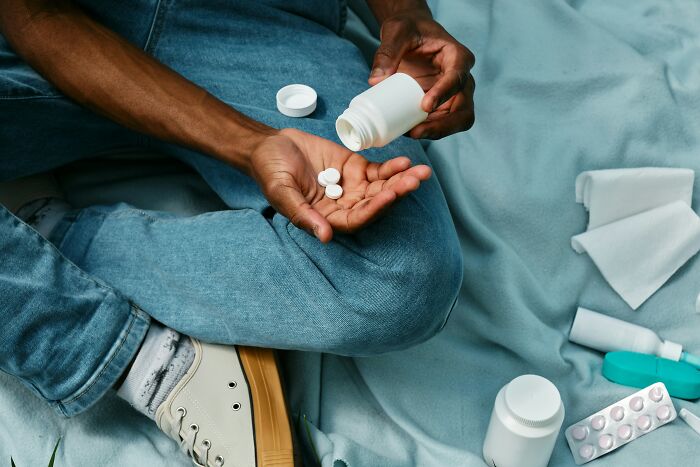
Image credits: trucK1998
The OP also shared some safety tips that they think everyone should know. "Don't be a hero. Too many people want to save a dog from a burning building or zap someone with a defibrillator because they saw Ryan Reynolds do it on TV," Zapinsure says. "Firefighters have had to save 2 bodies instead of just 1 from a burning building because Joe Superman collapsed from heat exposure and smoke inhalation after diving into a literal inferno. Leave it to the professionals."
"The best place to store water is inside your body," the author continued. "If you've seen 127 hours, it's based on a true story. A man gets trapped under a rock for several days and forces himself to ration his water. This likely didn't help his chances of survival. If you're down to your last bottle, and you're parched as a beached whale, then drink it all. This will stave off the effects of dehydration and help you to better devise a plan. Rationing is for food, not water."
#4
If someone “isn’t acting right” the time to call 911 is right now. I can’t tell you how many times someone has had a full blown stroke the night before and their family wanted to “wait and see what would happen”. The answer to that question is “well, last night we had a good chance of stopping or even reversing this but now your mom will be like this forever. That’s what happened “. When someone is having a stroke time is absolutely critical. Stroke care has made amazing progress over the years but all of the amazing things that can be done have a pretty short time frame for when they can be done.
I bet you’ve never apologized for bothering a McDonald’s employee when you’ve wanted a hamburger. You’re not “bothering” us either. Please call and let us help you.
Edit: The most common fatal mistake people make is not calling 911 soon enough.
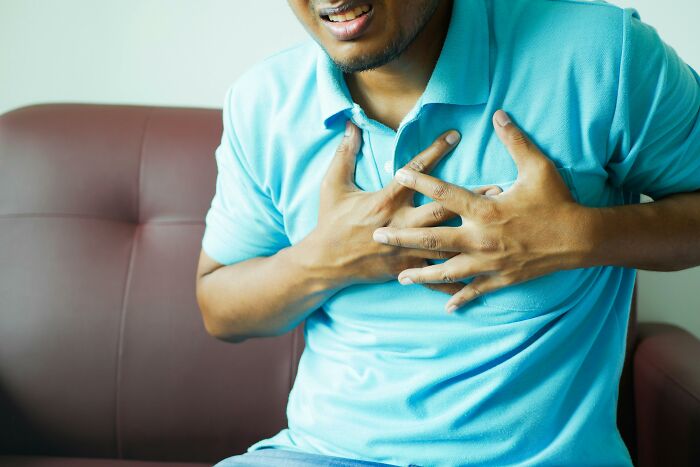
Image credits: medic8388
#5
Mowers
I have transported people who defeated the dead man switch on their riding mower and then rolled the mower into a ditch. Dont do that.
I have transported children who were trying to get mom's attention while she was mowing only to slip on the loose grass and end up under the mower
I have transported children who have penetrating face and neck wounds from dad hitting a rock while mowing.
Don't have children on or around operating lawnmowers.

Image credits: _opposablethumbs
Zapinsure also says that, if you're lost, it's best to simply stay put. "People that are reported missing are often rescued within 24 hours, provided they don't leave their last known location," they noted. "Make sure your last known location is known to someone. Tell a friend where you're going and when they can expect you back."
#6
Believe it or not there are still some that swear seatbelts take more lives than they save and absolutely refuse to wear them.

Image credits: Plateau9
#7
Call 911 as soon as you think there's an emergency. It's better to have us rolling out and it turn out to be nothing...than have you waffling on whether or not to call. We don't get mad/care/complain when people call 911 in good faith...even if it turns out you were mistaken. It's what we're here for.
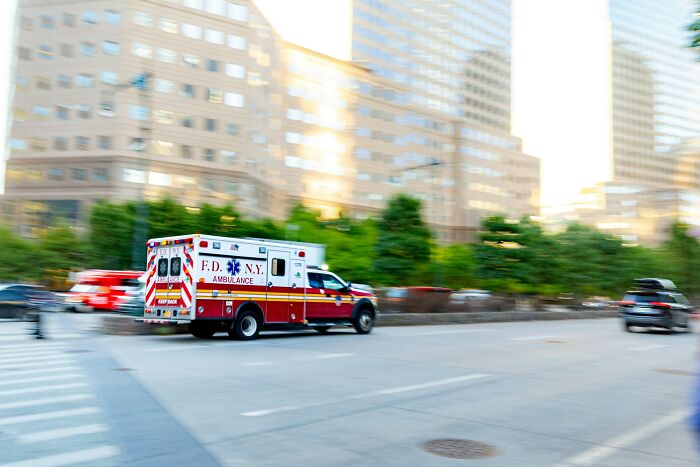
Image credits: anon
We also asked the OP what they thought of the replies to their post. "[They] were variable and somewhat helpful. Some of them I have had to apply to a degree, and some of them I hope I never have to apply," they shared. "Here is an example of one. This is the reply of a 16 year firefighter: 'If there's a fire and you get out... Don't. Go. Back. Inside."
"Here is another reply by a user with unknown professional background: 'Going into the water to save another person without an appropriate kit and training... Seriously, just NO. Do not do it, doesn't much matter how strong a swimmer you think you are!'"
Zapinsure says they've actually applied this advice to a degree. "I've been a Divemaster since 2023, and panicked divers are unpredictable at best. As part of my training, if a panicked diver latches onto you, we are trained to descend into the water because the LAST place a panicked diver wants to go is back under water. They will release you, so that you can re-access them from the rear."
#8
Moving a person who has been in a serious auto accident could cause further injury. Let the professionals do it.

Image credits: Visible-Ant1949
#9
Keeping area rugs/carpet runners/other trip hazards on the floor of your elderly parents/grandparents home.
A broken hip is often the beginning of the end for folks over 70.

Image credits: JshWright
"Lastly, trust your gut," the author told Bored Panda. "This is huge. I'm sure this has saved my bacon without even realizing it. People are dangerous, and we are well adapted to this. I've crossed busy streets just to avoid one person. I have violated the terms of social conventions just to distance myself from a single individual who just ain't right. That yucky feeling in your stomach will save your life."
Finally, Zapinsure added, "It is a fascinating world we live in, and it's best to be ready for it."
#10
Long hair always pulled up and wrapped tight, especially in children. I worked in an ER and was surprised by how many injuries were from hair getting caught in a motor, belt, pool, etc. ALWAYS at carnivals/fairs, biking, any outdoor event have hair up and wrapped. Saw some terrible injuries.

Image credits: robinsrecovery
#11
Don’t stick your hands places into places you can’t see.
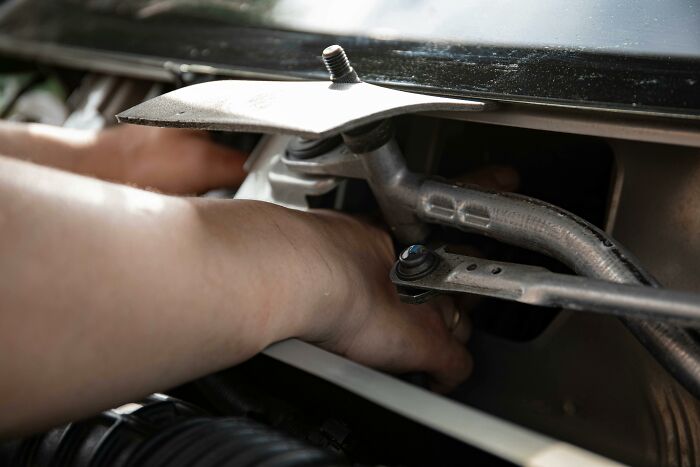
Image credits: blackcrayoneraser
#12
Fire extinguishers are great to have. They work great for what they are intended to do. But if your house is on fire, and the fire extinguisher doesn't put it out immediately, get out of there and call 911 from a safe place. We have more, bigger, and better fire extinguishers...and hoses...with engines that have big water tanks

Image credits: anon
We were also lucky enough to get in touch with David Dachinger, retired Fire Lieutenant and Executive Producer and Host of the Responder Resilience podcast, to hear his thoughts on this topic. First, he shared some of the most important safety tips that we should all know.
"These are simple, logistical ways to make it easier for first responders to help you in an emergency," he noted. First, make sure that your home has a visible house number. "Ensure your house number is clearly visible from the road, especially at night. If needed, direct responders with lights or have someone flag them down."
#13
I know these points are made a lot, but don't drink and drive. Don't get high and drive. Don't text and drive. It is repeated over and over but yet we constantly see accidents and fatalities because of this. It is so easy to avoid. If you are drinking or using d***s, have a sober driver/taxi/Uber drive you, or stay at your home. If you need to text, like it is a true emergency, find a safe place to pull over and park to send the message, otherwise just wait.

Image credits: Data-Minor
#14
I'm a firefighter with 16 years on the job. If your carbon monoxide detectors are going off, get everyone out of the house and stay out. Don't try to figure it out yourself. If the weather is bad, go to a neighbor's house or your vehicle.

Image credits: anon
It's also key to make sure that first responders have clear access to your house. "Move vehicles blocking access to your home and secure pets to avoid complications," David says. "Clear a path for stretchers, and ensure the entrance is unobstructed for ambulance and crew access."
Patient information is also important. "Have the patient’s medical information ready, including Do Not Resuscitate paperwork, medical history, medications, and allergies," the expert continued. "This speeds up care and helps with decision-making."
Finally, David says, "Keep a 'File of Life' form with current contact and health care information on your fridge. Know where medications are located for quick access during emergencies."
#15
If you need to call an ambulance, go to the ER, or go to urgent care, bring a list of your (or the patient's) medications. I don't care if 'they should have them in the computer.
And if you take medications for something, it's something you should report when asked if you have any medical problems (aka medical history). I can't tell you how many times I've asked someone that question, and they've said they have no medical problems, only to find out they take 10 medications every day. If you take medications for high blood pressure (hypertension), that is a condition that you have, regardless of how well your blood pressure is currently controlled. Conversely, just because you don't take medications for a condition doesn't mean you shouldn't still report that condition. Yes, it can make a difference. Sometimes, a very life-altering difference.
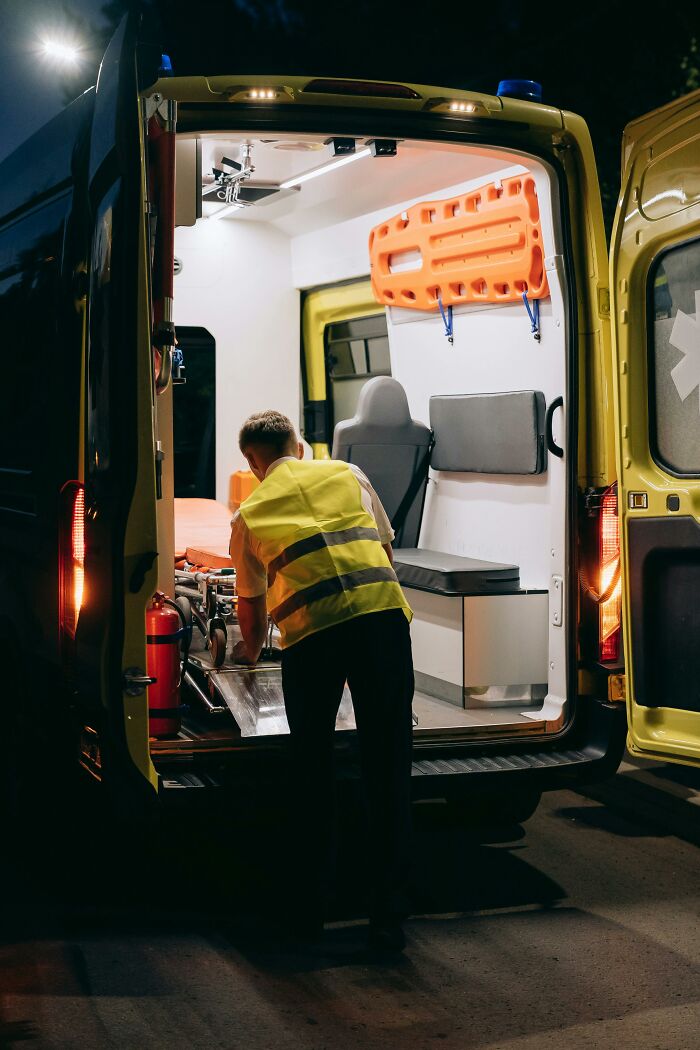
Image credits: anon
#16
If you get distracted while driving and your tires go over the side of the road, don't freak out and whip the wheel to get back on. You'll over correct and go across, likely into a tree on the other side. Or another driver head on. Had a girl recently do this and while she died instantly, her parents were just in front of her and her dad got second and third degree burns trying to get her body out if the wreckage.
To the point, gradually get back on the road, and if impossible, out hazards on, come to a stop, then rejoin the road when safe.
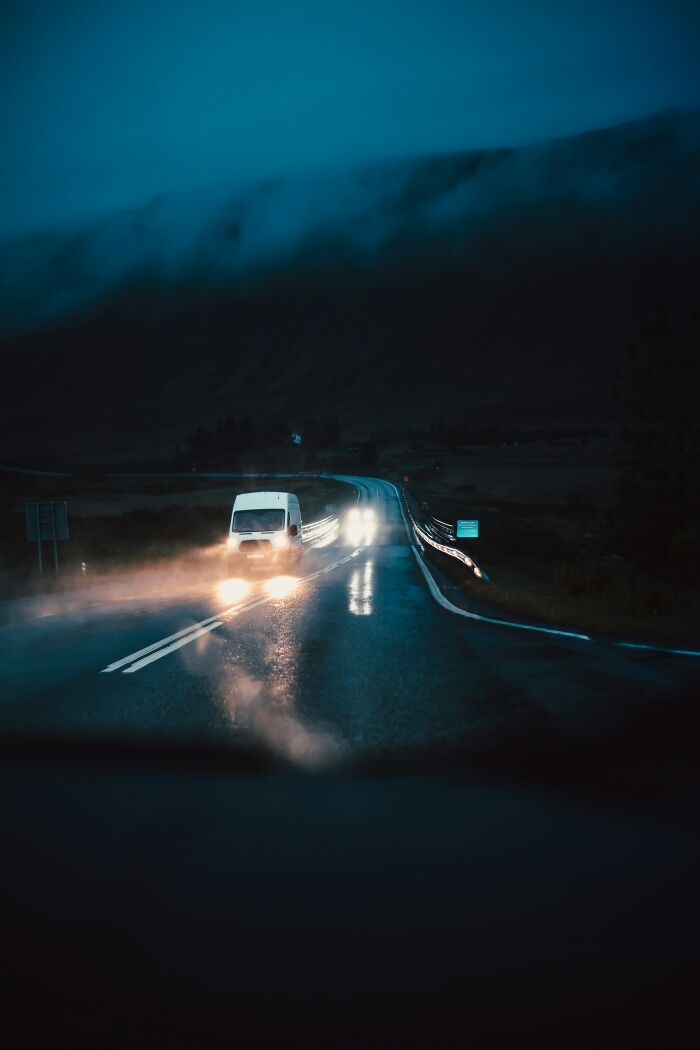
Image credits: Oscote_
David also says that, if you're ever in doubt, don't hesitate to just call 911. "One important thing that many civilians may not know is that, once we arrive on the scene, we evaluate the patient's condition," he shared. "If the patient is over 18, not experiencing a medical emergency, and can clearly communicate their wishes, we cannot force them to go to the hospital."
"In such cases, Emergency Medical Services (EMS) will have the patient sign a 'refusal' form, allowing them to seek care on their own," David continued. "However, if a patient is unconscious, has a severe injury, or is unable to communicate due to their condition, consent for treatment and transport is implied, since a reasonable person would acknowledge that treatment is necessary."
#17
If you don't know what to do...please don't try to 'help'. You're going to cause more confusion and/or delay. Getting out of the way is going to help a lot more.

Image credits: anon
#18
Going into the water to save another person without appropriate kit and training, seriously, just NO, do not do it, doesn't much matter how strong a swimmer you think you are!
Three bodies instead of one is not an uncommon outcome here, and three bodies, the first of them a dog is not at all unheard of.
The inshore lifeboat coxswain knows the tidal flows, knows where the hidden hazards are and drills for this s**t, and that crew are also (critical) used to pulling panicking people out of the sea, they know how to do it in such a way as the rescue does not end up with the rescuee grabbing on in a way that prevents anyone actually managing to swim.
Oh on the subject of water, a foot of fast flowing water will easily carry a big car away, don't try it.

Image credits: dmills_00
Next, we asked David what first responders want everyone to understand. "Your safety is our top priority. We take pride in responding to calls with our fire trucks and ambulances to assist those in need," he shared. "Please don’t hesitate to call us when you have an emergency; it's better to let us check it out instead of trying to handle it on your own. We have the training, experience, and specialized tools to address nearly any situation."
#19
Not an EMT. I work in medical records in a hospital and have read many thousands of ER reports.
Do not celebrate your 50th birthday by getting drunk and then lean over to pet a stranger's dog as you are exiting the bar.
Do not put Gatorade bottles into your r****m.
Do not swallow two live snakes in an attempt to impress your date.
Do not get drunk and then ride in the open back of a pickup truck.
Be extra careful in the bathroom. Bathrooms are dangerous places. They can be slippery, and if you fall, anything you land on is going to be very hard.
#20
My dad is an EMT, and he says people will call, give him an address, but then move somewhere else. He says it's as if purple think he will just sense that they move.

Image credits: Toxopid
The expert also wants to remind readers to change the batteries in their smoke and carbon monoxide detectors when they adjust their clocks. "A small investment in batteries is priceless compared to the potential devastation of not being alerted quickly to a smoke, fire, or carbon monoxide threat," David warns. "Many fire departments offer services to check your detectors and replace batteries for citizens and seniors as a public service."
#21
Don't put water on a chip pan fire. It will explode.

Image credits: 2PhatCC
#22
Emt/ski patrol. Ski conditions change with weather, that run you skied last year might be a sheet of ice and if you fall you are going all the way down. Ski run ratings differ from resort. Just because you skied “the blacks” in the east doesn’t mean you can do that in the west. Obey avalanche closures also, that untouched powder field isn’t some patrol stash it is closed for a reason and you put yourself and others at serious risk when you duck the wrong rope.
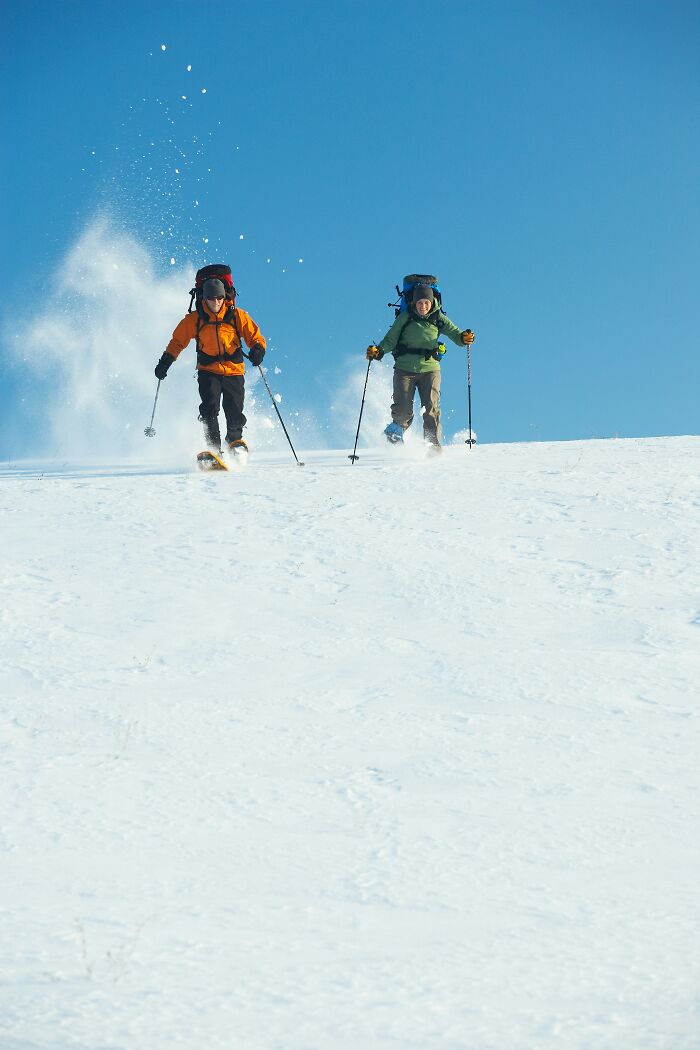
Image credits: Shred_turner
Finally, David says, "If you have a monitored alarm system, submit an updated alarm registration form to your local fire department, police department, and/or alarm company. This form contains important information such as key holders, emergency contacts, alarm and door codes, and the locations of the alarm panel and utilities. This readily available information can significantly improve our ability to access your home during an emergency if you are out of town or unable to answer the door."
And if you'd like to hear even more from experienced first responders, be sure to check out the Responder Resilience podcast!
#23
Running to pull someone out of burning vehicle is a great way to risk losing your life or causing serious injury to yourself. It is so unbelievably important to let the proper personnel deal with each situation and NOT risk causing more casualties.
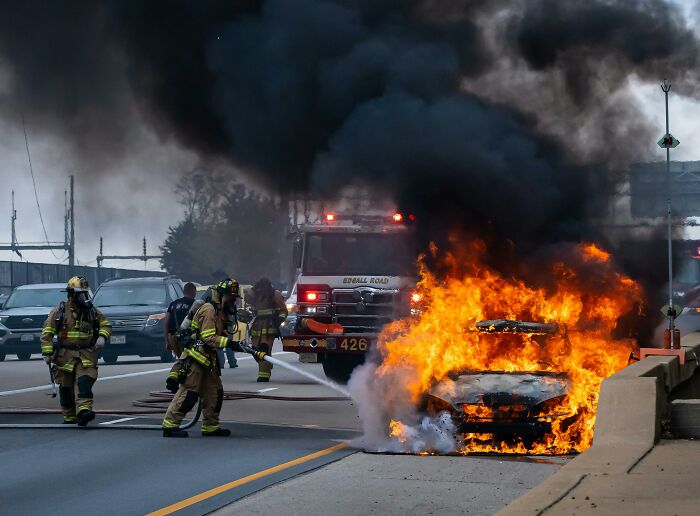
Image credits: Two-Shots-Of-Vodka
#24
I've spent eight years in rural rescue. Keep an eye on your kids when you’re out in nature. Look away for a second or two, and the next time you see them may be in a coffin.

Image credits: KP_Wrath
#25
Firefighter here:
For the love of god, wear your seatbelt, don't text and drive, and don't drive after drinking or while high.
It's never a good outcome for anyone involved.
Flashback to when I first started in the fire service. 3 teenage girls driving along 2 lane country road at night. Speeding, intoxicated.
They take a turn too fast. This SUV flipped over and goes down into a gully, on it's roof. Passerby sees the wreckage and calls us.
We get there and 1 of the girls is sitting on the side of the road, crying. Telling us her 2 friends are still down there.
We find 1 in the wreckage. Extricate her and she gets flown out. 1st girl is transported via ambulance.
For the life of us, we cannot find the 3rd. Search the woods in all directions, inside the vehicle, other side of road, even.
We're combing through every part of this entire area, and one of the guys spots the tip of a shoe underneath the vehicle.
Wear your seatbelts. Don't drive while intoxicated/ high.
Car accidents are by far, my least favorite call to run on.
#26
If someone is having a seizure, do NOT put anything in their mouth. Ever. There is no such thing as "swallowing your tongue." Also, do not hold them down to try to stop their limbs from moving. Move dangerous objects away from them and roll them on their side when the seizure is over.
If you need to call an ambulance/go to the ER/go to urgent care, bring a list of your (or the patient's) medications. I don't care if "they should have them in the computer."
If you take medications for something, it's something you should report when asked if you have any medical problems (aka medical history). I can't tell you how many times I've asked someone that questions and they've said they have no medical problems, only to find out they take 10 medications every day. If you take medications for high blood pressure (hypertension), that is a condition that you have, regardless of how well your blood pressure is currently controlled. Conversely, just because you *don't* take medications for a condition doesn't mean you shouldn't still report that condition. Yes, it can make a difference. Sometimes a very life-altering difference.
Allergies ≠ medication preference
Allergies ≠ experiencing a medication side effect
Most penicillin (or penicillin class antibiotic) allergies are not actually true allergies. If you think you're penicillin allergic because your mom or dad told you that long ago you got a rash, it might be a good idea to checked to see if you really are allergic. A penicillin allergy means that you can't/won't be given not just penicillin, but many other related antibiotics. For certain infections, this can seriously limit the number of effective antibiotics that can be given to you.
Iodine allergy ≠ shellfish allergy ≠ iodinated contrast (CT dye) allergy. These are all distinct allergies and having one doesn't automatically mean that you have the others. Also, while some people have reactions to povidone iodine (reddish brown skin disinfectant) and describe this as an iodine allergy, it's not really iodine that you're allergic to. Iodine is an element and as such, is much too small to be a true allergen. Not to mention the fact that our bodies *require* iodine to function (via our thyroid gland), so if you were truly allergic to iodine, you wouldn't be alive.

Image credits: anon
#27
Many drownings could be avoided: if you are going out in a boat wear your life jackets. Drinking alcohol and water element isn’t a good mix. Keep close eye on your kids there and make them wear some sort of float equipment (best would be life jacket if they can’t swim, even if they are not swimming but are hanging out close to deep water) and put them into swimming lessons early. If you are an adult and can’t swim, take swimming lessons. And keep in mind that it can get deep quickly. Don’t go to frozen lake/sea if you don’t know how good the ice is.
In my country most people celebrate midsummer day near lake or sea and drunk as f**k. And every year we have this game at work where we quess how many will drown this year during the midsummer weekend.
#28
Lying.
If you don't know, you don't know. And you should say so.
Don't know what the BP is? Don't lie.
Don't know where something on the truck is? Don't lie.
Not familiar with a patient's condition? Don't lie.
#29
Drifting onto the soft shoulder of the road and overcorrecting.
Because the tires don't grip well on loose dirt, the driver turns the wheel farther than normal to get back to the pavement. When the wheels do contact the pavement, they grab and immediately turn the car toward the opposite side of the road. The car usually spins as it does so. If they're lucky, they just go off the side and stop. Sometimes there's a cliff or an oncoming vehicle.
The thing to do is, once the car is correcting course, turn the wheel back toward straight *before* getting back on the pavement. Be prepared to correct the steering very quickly in either direction when returning to pavement.
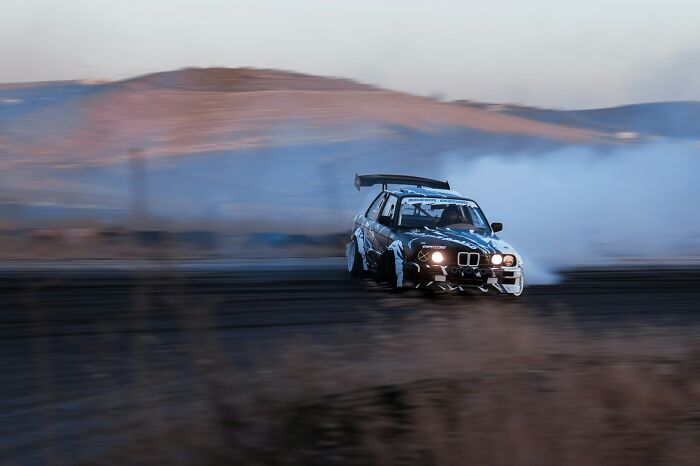
Image credits: MentORPHEUS
#30
Not an “on the road” mistake but still something I think is important: Taking criticism from senior medics as personal attacks. 9.5 times out of 10 we’re not saying you’re s**t, we’re trying to help you learn and grow. A lot of new medics take things too personally. And actually listen to the criticism and implement it going forwards, we genuinely don’t want you making the same mistake over and over because that’s when it will start to get personal.
#31
Old cars are death traps. Burnouts are fun and all, but if it catches unexpectedly, you may be the crumple zone.

Image credits: KP_Wrath
#32
8 years in rural rescue. Not quite the same, but comes with its own incidents:
Keep an eye on your kids when you’re out in nature, look away for a second or two and the next time you see them may be in a coffin.
Old cars are death traps. Burnouts are fun and all, but if it catches unexpectedly, you may be the crumple zone.
Motorcycles are, and always will be, dangerous. Leathers will help keep you in one piece.
Seatbelts and helmets will keep off-roading toys fun. You roll one and you aren’t in safety gear, you may die, you may spend a year in physical therapy.
Your standard vehicle will go 110 mph. If you wreck it at 110 mph, odds are you will be crippled or killed.
Every one of those was a maiming or death. Those don’t include the “wrong place, wrong time” incidents. Those get into the dozens. The most memorable to me, we were able to save, but f**k was he lucky. Old pick up truck, ran off the road, hit a tree, turned into razor sharp sheet metal. It severed the guy’s femoral artery. Entire floorboard of the cab was filled with blood. My captain shoved gauze into this guy’s leg and ball sack until he stopped spurting, we cut the door off, lifted what was left of the dash, and got the guy out. From the time we got to the scene to the time he was out was 8 minutes, from then until medical was another 4. He probably should have died before we got there, we were 20 mins out.
Lots and lots of compound fractures. Again, that’s just bad luck, most of the time.
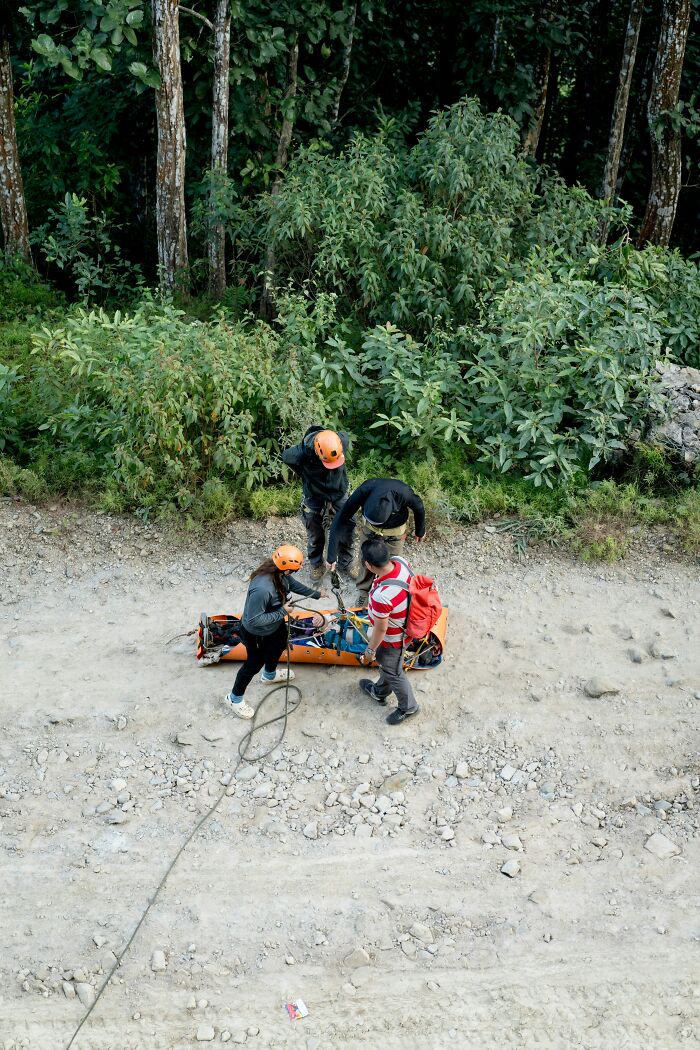
Image credits: KP_Wrath
#33
Trying to form a diagnosis. Don’t do that, it’s not the job. You can speculate about what caused something but trying to form an actual diagnosis leads to tunnel vision when you don’t have the practice or education behind it.
I am guilty of this. Early in my career I was so stuck on finding the problem, I didn’t manage symptoms or outliers as well as I could have. I was sure it was a stroke - but it wasn’t. I was sure it was an OD- but it wasn’t. And I missed critical interventions because of that.
Dont fall into the trap of being a smarty pants - treat signs and symptoms, check the basics, and make sure you get that into a cohesive report so the MD can make the actual diagnosis.
#34
Check every single intox bgl. Saw tons of bls just assume people are drunk and sloppy. Sometimes it's diabetes.
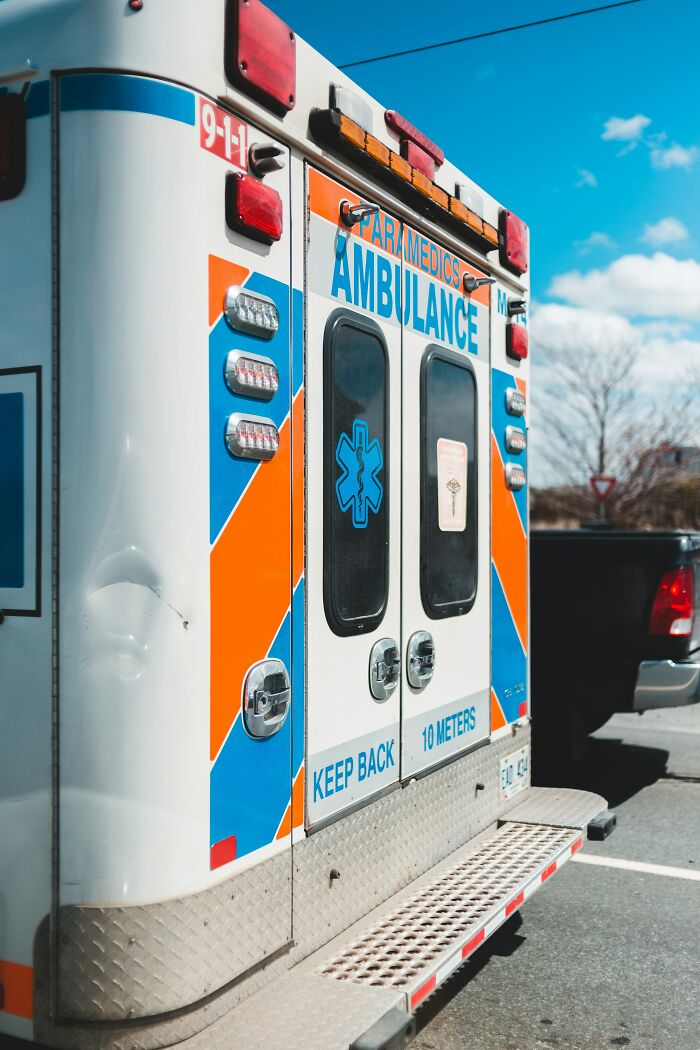
Image credits: kerpwangitang
#35
Learn to take a mental step back from the call.
If you get tunnel vision or too into your own head, you'll miss some of the bigger picture and may make less than ideal decisions.
If you catch yourself working up, take a second and take a deep breath, ground yourself, and get back into it.
#36
Letting PD walk all over you. I don't care if they called us just to CYA themselves, if they call somebody a patient, I am going to treat them like a patient until I clear. Not sure if it is just a local problem too, but oftentimes they are fairly lazy here when is comes to checking the psych patients of weapons. Once went to a call for a Pt completing of homicidal ideation wearing cargo pants where PD arrived first and said the scene was safe. They were ready to clear up when we arrived until I asked them to check his pockets, which contained 2 knives and a lighter.
Edit: Forgot the to include the issues of them telling us to draw up katamine before we even made contact. Never did, because usually it turns out the patient cooperates with us just fine, but was pissed off at PD for their usual antics.
OR when they give 8mg of narcan to a alert and breathing patient. I don't care if he is high, as long as he is breathing. Since I am riding with him, I rather he be chill for the duration of transport.
#37
Driving skills (EASY on the brake). Taking feedback without assuming it’s a personal attack. Being able to admit you don’t know.
Outside of work: get your d**n self in the gym and lift a weight or two a few times a week. This is a physical job. Most of our services are a disgrace to the uniform. Eat properly. Even better, go to a jiujitsu, wrestling, or mma gym and learn some self defense so you have some idea of what to do if and when someone picks a fight with you. Go to therapy, sooner rather than later. Figure out your coping skills so you don’t take stuff out on your partners and patients.
#38
Not taking responsibility for their own wellbeing. Don’t work stupid hours. Sleep. Eat. Exercise. Have a non-paramedic social life. Have a hobby. Avoid gossip. Avoid toxic attitudes and behaviours — try some gratitude, compassion, and levity.
Trying to diagnose things. Diagnosing things and feeling confident about it. Hint: it’s not always a UTI.
Actively trying to sign people off (see above).
Rushing. We’re not in school trying to beat a sheet on a timer. Drive slower. Handle patients gently. Do procedures properly. Actually pay attention when you’re assessing and listen when you’re asking questions.
#39
As a relatively new paramedic myself, the biggest mistake I made was not asking experienced medics enough questions, I thought I'd be looked down on if I didn't know everything. As others have said early burnout is super common, we have students saying they only want to work in the county because they don't wanna do calls. 6 months I was working with someone I got hired with and they refused to do a call because we "only" had an hour and a half left in our shift and made a crew that had been getting screwed all day with no lunch breaks go. When I started I always tried to work at the busiest stations so I could expose myself to the most calls and become more comfortable which really helped me develop my own routine on calls. One of the best things you can do as a student/new paramedic is realize you don't know everything, accept worry feedback and use it to improve.
#40
Thinking they [new first responders] have to adopt the jaded a*****e’s attitude and demeanor to be taken seriously.
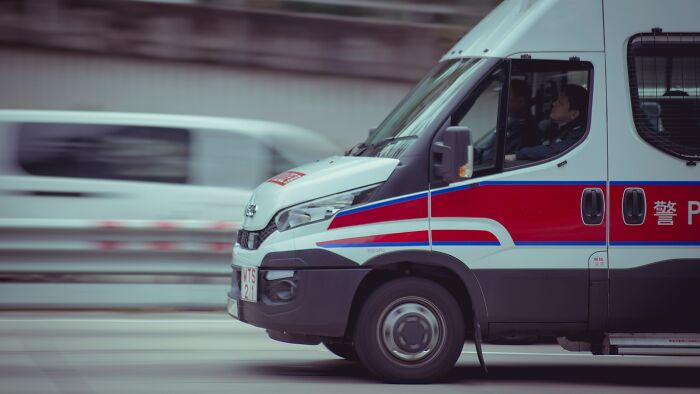
Image credits: Jedi-Ethos







